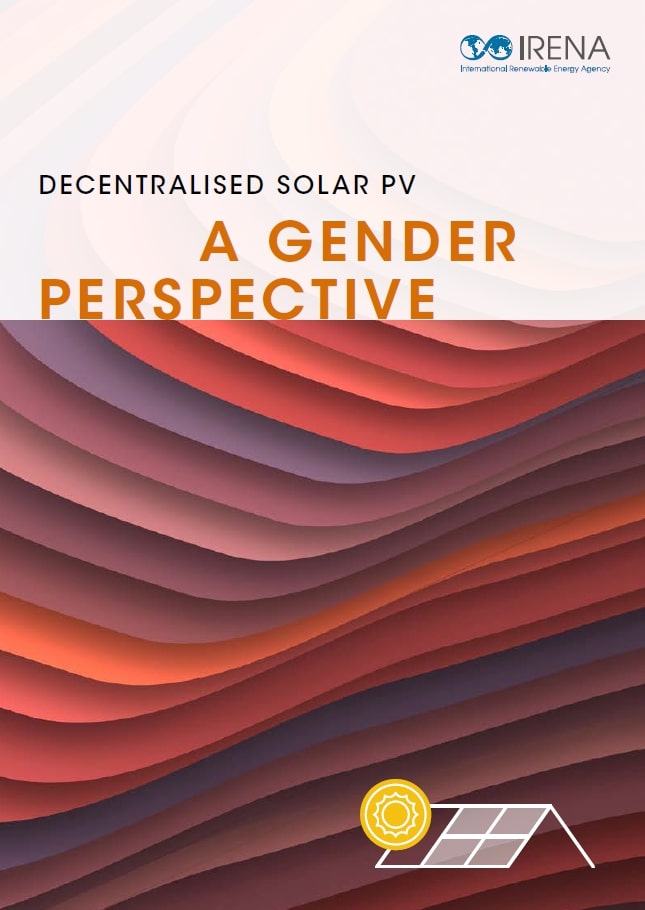Decentralised solar PV : A gender perspective
 |
Panneaux solaires photovoltaïques : une perspective de genre
rapport Oct 2024 ; 56 pages
Aut.
Ed. IRENA - Abu Dhabi ; Isbn: 978-92-9260-632-9
Téléchargeable sous format: PdF
Site internet: www.irena.org/publications
Page de présentation d'un éditeur
Abstract:
This report explores the status of female employment in the DRE sector, with a focus on decentralised solar PV.
It sheds light on the main barriers that women face in the sector’s workforce and how to bypass them based on five country case studies: Ethiopia, India, Kenya, Nigeria and Uganda. With that aim, it presents data from an exhaustive literature review, focus group discussions (FGDs) and expert interviews conducted in the five countries. It also provides recommendations for how to make the sector more inclusive, so that gender no longer determines whether talent enters the off-grid sector, or not. Contents:
Highlights_________________________________06
Introduction_ ______________________________08
1. Decentralised solar PV: Jobs, skills and the role of women in the workforce_____ 10
Decentralised solar PV jobs and skills____ 14
Women in the decentralised solar PV workforce_ _________________________ 17
Women and entrepreneurship in the decentralised solar PV sector__________ 20
2. Barriers to women’s employment in the decentralised solar PV sector_ _______________22
Societal constraints__________________23
Societal and cultural bias_______________24
Perception of gender roles______________24
Self-perception______________________25
Skilling, educational and professional development-related barriers_ _________26
Gendered workplace barriers___________28
Biases from employers and customers_____28
Pay gaps_ _________________________ 30
Safety and mobility___________________ 31
Lack of workplace flexibility_____________ 31
Barriers particularly affecting women entrepreneurs in the
decentralised solar PV sector___________32
Access to finance, ownership and assets___32
Unequal access to modern energy________33
Childcare and family obligations_ ________33
Case studies of women-led enterprises_ ______________________ 34
Alem Gebru Gebremeskel of Modify Electromechanical, Ethiopia_____ 34
Catrine Shroff of Mwangaza Light, Kenya_ _____________ 36
Juliana Lanyero of cloud-Green, Uganda________________ 38
3. Recommendations to increase women’s role in DRE________________________ 40
Improving market data and knowledge about women’s inclusion in the sector____ 42
Mainstreaming gender in all energy policies and programmes_____________ 42
Providing specific skill-building opportunities for women in all required competencies______________ 43
Tackling social expectations and the skills shortage_ _________________ 44
Creating a positive enabling environment for gender-responsive work___________ 45
Lowering barriers to women entrepreneurship_____________ 45
4. Conclusion___________________ 48
References_ ______________________ 52
Mots clefs: |
énergie solaire (CI) (DT) (OP) (ope) , genre (CI) (DT) (OP) (ope) |
Pays concernés: |
Ethiopie (CI) (DT) (OP) , Inde (CI) (DT) (OP) , Kenya (CI) (DT) (OP) , Nigeria (CI) (DT) (OP) , Ouganda (CI) (DT) (OP) |
Editeur/Diffuseur: |
|
IRENA
-
International Renewable Energy Agency - Abu Dhabi - Emirats Arabes Unis |
En cas de lien brisé, nous le mentionner à communication@pseau.org